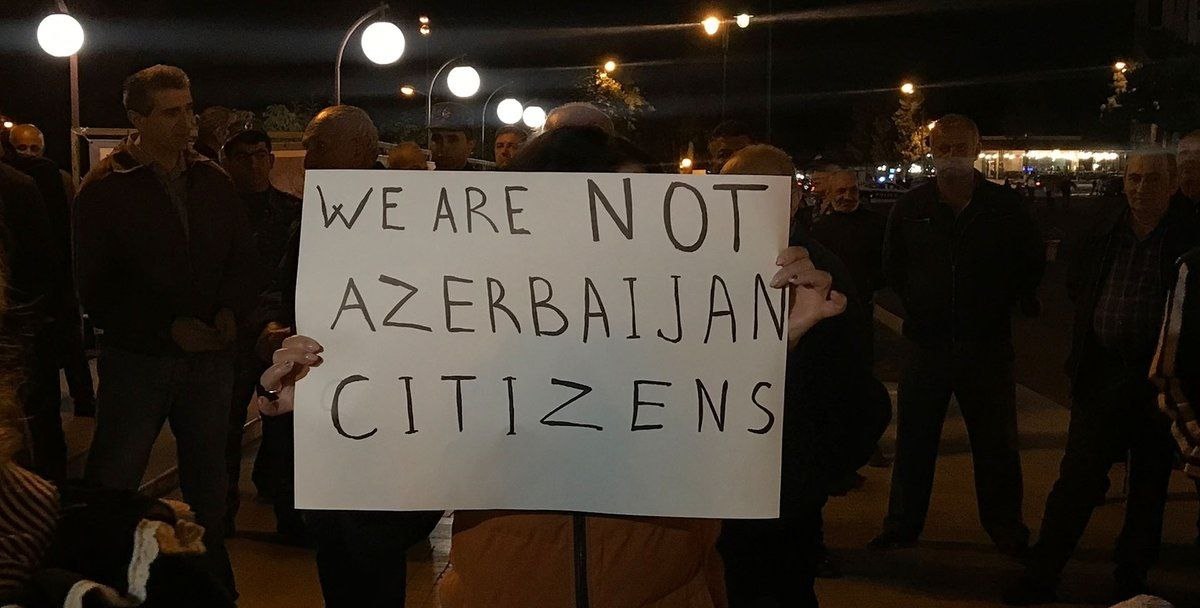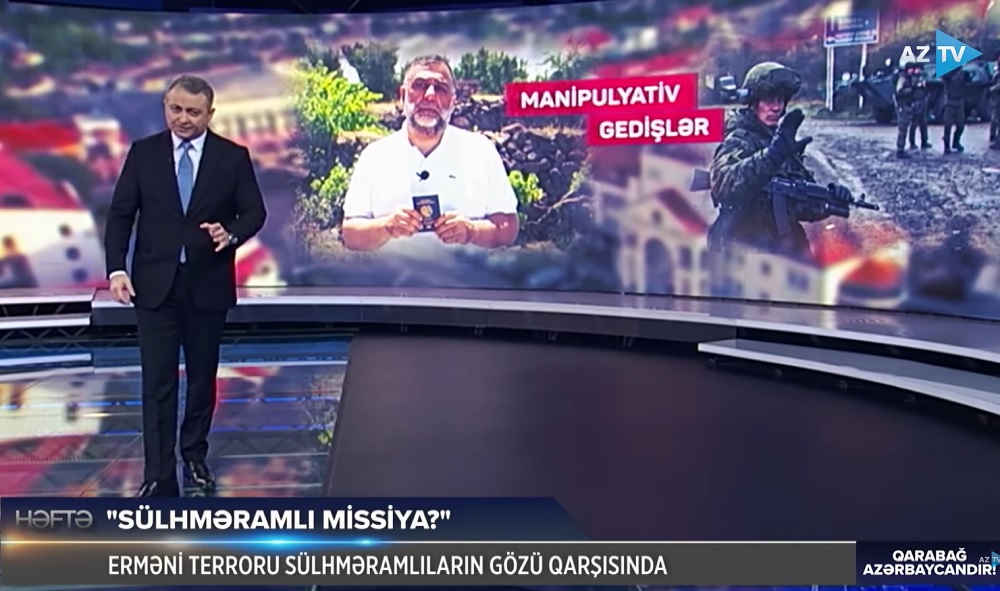“USA is for direct dialogue”: Mirzoyan-Bayramov talks in Washington
Mirzoyan-Bayramov talks in Washington
The latest meeting of the Foreign Ministers of Armenia and Azerbaijan took place in the United States with the mediation of US Secretary of State Anthony Blinken on November 7. There is little information about the outcome a day later.
“The foreign ministers exchanged views on the elements of a potential peace treaty and stated that there is a number of problems that still need to be addressed.” Negotiators “confirmed the commitments made by the leaders of Armenia and Azerbaijan” in Prague and Sochi, and “agreed to speed up their negotiations and hold another meeting in the coming weeks.”
The US position, and comments on the negotiations and the situation in general from Baku and Yerevan.
- Fourth meeting with Putin: did Aliyev and Pashinyan hold their ground?
- Will the Prague statement create peace between Armenia and Azerbaijan? News and analysis from Yerevan and Baku
- “Stepanakert should prepare for negotiations with Baku” – comment from Yerevan
Blinken: “Dialogue is the key to resolution of the conflict around NK and peace between Baku and Yerevan”
The United States, as a friend of Armenia and Azerbaijan, will do everything possible to support dialogue and efforts to establish a lasting peace, Anthony Blinken said at a meeting of Foreign Ministers:
“I believe that this is a promise of a better, brighter future. And I salute the courage and determination – both yours and your governments – that you are showing to achieve this goal.“
The US Secretary of State stressed that direct dialogue is the best way to achieve a truly lasting peace.
“The United States strongly supports the territorial integrity and sovereignty of both Armenia and Azerbaijan. The restoration of independence in 1991 was a vital moment in securing the rights of both countries, rights that we strongly support. I also consider it fair to note that the more than 30-year-old Nagorno-Karabakh conflict has led to huge human and material losses: lost lives and deep wounds. But what we are seeing now are real and bold moves by both countries to put the past behind them and work towards a lasting peace. Both countries are working for the bright future of the South Caucasus and the future of the world,” Blinken said.
Commentary from Yerevan
Based on the available information, it is difficult to talk about the effectiveness of the talks in Washington, political commentator Hakob Badalyan says. He focuses on a phrase in the message of the Armenian Foreign Ministry that “there are a number of problems that still need to be addressed.”
“This indicates a lack of agreement on key issues. I assume that we are talking about the issue of the status of Artsakh, the security and rights of the people of Nagorno-Karabakh. Differences on this issue also remain in Washington,” Badalyan told JAMnews.
At the same time, Badalyan believes that there is certainty on the issue of the Armenian-Azerbaijani border. This, in his opinion, is evidenced by the fact that the ministers reaffirmed the commitments assumed by the leaders of Armenia and Azerbaijan at the meetings in Prague and Sochi. “This can be considered a positive step,” although this is not enough for a reliable world, Badalyan believes.
“For the United States today, the key issue is Iran, as well as the confrontation with Russia. In order to promote the US policy on these issues, an attempt is being made to be active in the direction of the Armenian-Azerbaijani process,” he stated.
In the current situation, according to Badalyan, neither Moscow nor Washington will be able to lead to a breakthrough and create preconditions for a resolution of the Armenian-Azerbaijani conflict:
“The desired result is at least that this active stage of competition and confrontation does not lead to a military clash, to serious destabilization.”
According to Badalyan, if the parties were able to agree on this in Washington, then this is a significant result. He has the same approach to the results of recent meetings between the leaders of Armenia and Azerbaijan in Prague and Sochi.
Badalyan says that both the United States and Russia, as well as France and Iran, play their role in ensuring stability. In his opinion, the participation of these actors carries risks, but at the same time gives Armenia the opportunity to maneuver.
“The responsibility for promoting the stability of the situation should be assigned to all mediators or parties with mediation ambitions, so that the diplomatic process is more constructive,” he concluded.
Mirzoyan-Bayramov talks in Washington
Comments from Baku
Although the meeting between the foreign ministers of Azerbaijan and Armenia in Washington did not produce serious results, meetings away from Russia are useful because the Kremlin’s monopoly over discussions is weakening, Elkhan Shahinoglu, head of the Atlas think tank, says.
“The meeting in Washington was a kind of response to the Sochi meeting, and a meeting between Azerbaijani President Ilham Aliyev and Armenian Prime Minister Nikol Pashinyan is scheduled for November in Brussels.
As always, these meetings will displease the Kremlin, and Russian Foreign Ministry spokeswoman Maria Zakharova, like a parrot, will repeat words against US and EU mediation.
But if Baku and Yerevan do not refuse the intermediary services of Brussels and Washington, this means that the messages of the Kremlin are being ignored.”
The negotiation process has reached a kind of dead end, and there is a double game going on, says international affairs expert Rizvan Kerimov:
“The negotiation process between Azerbaijan and Armenia has now taken on a double and not entirely clear character. The conflicting parties, through the mediation of the European Union, agree on recognizing the borders, on the status of Karabakh and ensuring the security of the Armenian population of this part of Azerbaijan. With the mediation of Moscow, we are talking about some maps that are available only in Moscow, about postponing the discussion status of Karabakh for an indefinite period.
One gets the impression that negotiators change their tone depending on where the meetings take place, as mediators’ approaches to key issues sometimes differ radically.
As for the prospect, there are two options, in my opinion.
Either Moscow and Washington should act in a coordinated manner in resolving the conflict, i.e. bring their strategies as close as possible, or Azerbaijan and Armenia should refuse the services of one of the mediators. But these options are almost impossible today.
Otherwise, the route Moscow-Brussels-Washington is unlikely to lead to any real solution, and negotiations could continue in this way indefinitely.
There is another dangerous prospect: one of the sides of the mediators, most likely the characteristic behavior of Moscow, may provoke a military conflict “on the ground” in order to assert its dominant position in resolving conflicts in this region. This is a very dangerous scenario, and this should be avoided if possible.”
Mirzoyan-Bayramov talks in Washington




















